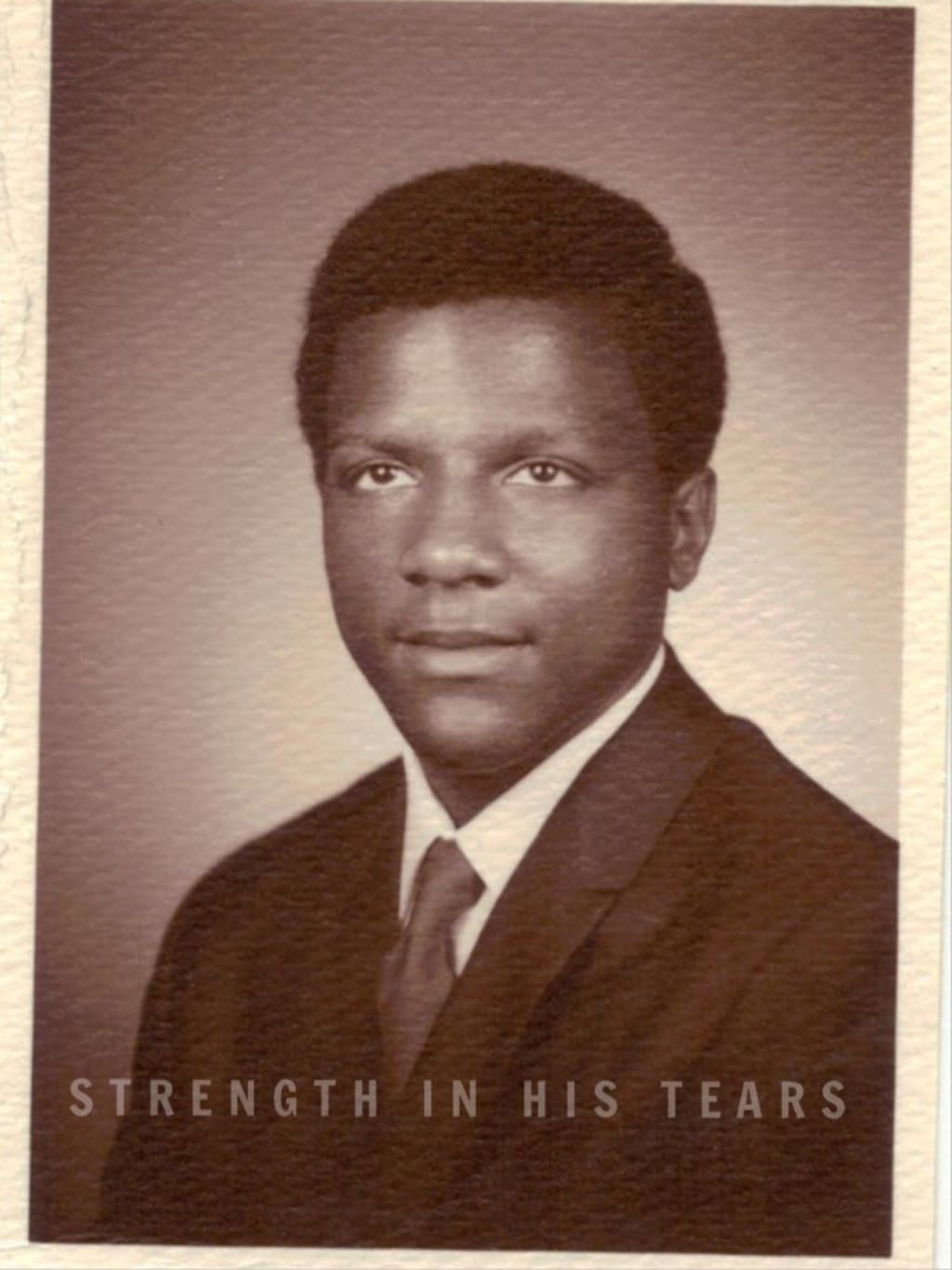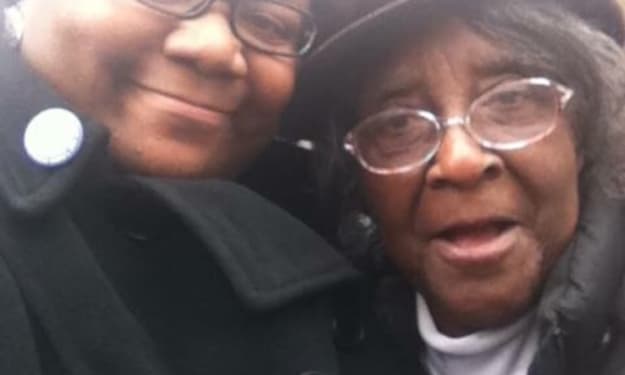Strength in His Tears
The Power of Expression

My father is a strong person. He’s also layered, interesting, and a little complex. I’ve known him for thirty-two short years, and have been in awe of his person the entire time. To write about him would result in volumes of work: his upbringing, his life in Chicago, and the many trials and tribulations he has faced. I’d love to tell the entire world how Ronnie David became the person he is today. His ability to express himself, however, is my most favorite subject.
My father, at first glance, may seem like a fellow who’s locked tightly. He isn’t cold or deeply reserved, but he’s not quite an open book. Yet, as I’ve witnessed him moving around this world, he’s turned a few pages of his story to show me what he’s made of. He is kind, funny, opinionated, and wise. He can be stern and a little cold when the last straw has been broken. Yet in his calm after the storms of emotions, he’s able to reveal a loving tenderness and understanding that’s as soft and delicate as the finest Italian silk. He’s got Southside of Chicago smooth soul that’s calm and collected, and a jovial sci-fi geek who’s been there with Captain Kirk since day one.
I have seen him evolve and grow into many emotions with wide eyes and an open mind. I have seen him trying to understand the conditions of humanity: death, sorrow, defeat, and even apathy. He has grown from the fiery ambitious 30-something who was determined to prove the world wrong about single fatherhood, to the Zen-like 60-something wiseman who found his peace in the beauty of roses.
My father opened my eyes to some great truths: a man in touch with his feelings is an amazing thing. To nurture him is to validate him. When he feels validated, he becomes more open. When he’s open, the lines of communication cannot be confined. He is at peace to be himself. He can grow as a person.
My father is often in a mode of reflection. He may close his eyes, walk with his hands behind his back, and maybe sing a tune. He listens to Sade and Ramsey Lewis. He adores Send in The Clowns, and his heart swells for Bolero. He can also be introverted and stoic, which seems like anger, but is often a heavily introspective silence. He is always thinking, wondering, and looking ahead. He troubleshoots as most retired engineers do, but there is a tenderness to him. If he doesn’t understand, he asks. He takes caring pride in understanding various points of view.
Most men don’t want to be seen as “tender.” It may sound weak or soft to them. His tenderness, however, has made way for understanding situations in ways that I never thought were possible. His caring interest reveals the heart of a man willing to show empathy. He can be very guarded, but I’ve seen him blossom with love over a touching movie. He has sympathized with those who’ve lost a loved one. I’ve seen deep concern over troubles of the world, and sparkling joy over the wonder of children and his two parakeets. He’s willing to be vulnerable. I call that “strength,” because he’s been unafraid to show the world who he is.
I love that he gets excited over new technology, or the latest episode of Rick and Morty. I love when he calls just to talk about his birds or his flowers in the garden. When he’s had a good meal or a good day, his voice is light and cheerful. It doesn’t take much to make him happy. He’s in touch with himself, and has found an emotional balance where he feels comfortable.
My father, when asked, often says that he was “raised All-American”. That meant he obeyed the law, he didn’t do hard drugs, he respected his elders, and he didn’t look like a hippie. He went out like most teens and young adults his age, but he knew when to call it a night. In other words, his path was rather straight and narrow. He stayed out of trouble, got a job, didn’t get anyone pregnant, and basically made my grandparents feel at ease. I’m sure my grandparents validated whatever he felt, but I don’t think there was much room for deep “touchy-feely” moments. He, like many other Boomers, was raised to contribute to society.
When he first told me about his upbringing, I wasn’t thinking about his ability to feel on a deep and vulnerable level, let alone cry. I never saw my father as an unkind person. I was rarely spanked, as he resorted to talking to me about things I’d done. He’d take away television or video game time, but I never felt like he was heartless.
What led me to understand the depths of his emotional abilities was death. Our family was well-acquainted with it. He’d seen friends and colleagues pass away as he became an adult. He lost a wife, a girlfriend, and various family members. Life often faced my father in painful and sobering ways that quickly required him to adapt.
Death was a big part of my childhood, and it started with my mother in 1988. What started as a headache ended up as several strokes and a coma, and lead to her passing away. She had an aneurism from a blood transfusion she needed after my birth. It tore my father apart, yet he endured. I can’t give you the full scope of that period of time from my point of view. My memories are fuzzy. According to my father, each moment is etched into his mind forever. With softness in his voice, he recalls sitting in the hospital room with mom. As he tells the story, his voice becomes deeper. He relives the heartache that took away his soulmate, revealing a powerful vulnerability of the human soul. His eyes often face forward, and he frowns a little. The wounds, he’s told me, are fresh.
“It never stops hurting but you have to keep livin’.”
My mother was a beautiful woman: artistic, faithful, and full of love for all people. She loved children, and was a Pre-K teacher for years. As my father would describe her, his voice would deepen yet again, and soften. It was almost a murmur as he recalled the love they shared, and how badly she wanted a family of her own. They’d planned forever, but it just didn’t work out that way. It’s the details that send him into a soft-spoken trance of reflection. His love for her immortalizes who she was. I thought it was beautiful how he shared such candid moments from his heart. These are always candid moments where he’s open to being tender.
When dad’s father died in 1991, I do not recall any tears. Did he care? Of course. Was he hurt? Having seen his father go from a peanut roaster to a terminally ill man did take a toll on him. Any tears shed were hidden from me. I remember him calmly setting up visitation shifts between grandma, his sister, and himself. There wasn’t time for tears.
From stories past, I knew my father deeply respected my grandfather. As my grandma sobbed, and my aunt shed tears, I believe he was trying to maintain himself as the pillar of the family. Looking back, I realized that my father often tripped the lines between beautiful, admirable sensitivity, and a tight maintenance of the masculine status quo. He was both expected to be a masculine figure and be sensitive and open. I think he does a great job, with great humility. He’s always willing to learn. Yet as society has revealed time and time again, sometimes we mistreat men who show any signs of sensitivity and emotion. We are surprised, we laugh at them, we emasculate them.
My father did not want to be seen as weak.
Between coping with losing his father, his wife, and dealing with the judgments of single fatherhood, my father endured. As long days and nights at his job yanked him to and fro, he endured. I realized that in this time, he was trying to set a good example for me. As a child, I was blissfully unaware. We don’t always understand the way life happens for our parents. If we do, it may not be a very deep understanding. If it’s deep, how many of us questioned our parents about it? Our parents don’t reveal all until much later. I never knew all my father went through until I became an adult. His struggle is admirable because he grew from it all. He didn’t become hateful or hardened. Instead, he opened himself to the universe.
When we visited my mother’s grave, I never asked questions. I knew why we were there, but not why he always wore his dark Ray-Bans. I stood next to him in perfect silence, studying his face. I always searched for his eyes behind those amber and black sunglasses, but could barely see them. His face was always solemn and in a slight frown. The air was heavy, and I had so many questions. He was a widowed husband aching for his soulmate. We drove in the gray Lincoln Towncar she helped buy, when we came to visit. I watched him closely, wondering what was next. He was so tightly composed, yet I felt his sadness. He wanted us to be together again. He wanted his wife back.
Years passed, and he eventually met another woman from Washington DC. She was Jeannette; a beautiful woman with soul-searching eyes, and she brought out a side of my father that was fun and sophisticated. Their paths seemed perfectly aligned, but fairness of time was not. With her in the East, and my father in the Midwest, they never found a way to meet in the middle. I wondered why for years, as I loved her just as much as he did. I liked her kids, and my grandmother adored her.
“I just couldn’t take losing someone else that I loved,” said my father.
This was, in fact, years after she’d died of complications from sarcoidosis. Again, this was a candid moment between my father and I, where his soul was wide open. I realized he had way more layers to the person he appeared to be. He felt as if loving another woman deeply would cost her life. After losing mom and then his beloved Jeannette, my father feared taking another chance with love. It hurt him too much.
Living with my father, I came to understand that men and women feel things in different ways. I learned that men are not incapable of feeling, but are often guarded because of how society treats them. My father, it turned out, had learned to expand the capacity of his compassion from the 16 years he’d spent with my mother. Her tenderness rubbed off onto him. Having to raise me (with lots of help from his mother) only expanded his understanding.
My father’s growth as a person determined his current path as an elder. I’d like to think that his ability to be caring and tender is the reason why his mother survived and thrived for 15 years, after her Alzheimer’s diagnosis. He already loved her with his entire heart, and he took it a step further by making sure she had the best care. Diagnosed in her late seventies, it wasn’t until her early nineties that her health began to decline.
Caring for my grandmother, my father put his life on the line. Instead of putting her in a home, he found innovative ways to make her life in Chicago as comfortable as possible. He met her quirks with troubleshooting ease, he never made her feel bad about herself, and there was always good music on the house radio. He kept the freezer stocked with the best from Omaha Steaks, and her skin was flawlessly moisturized. If he were a different person, I’m sure he would still be compassionate, but his investment may not have been the same. Through loss and evolution, he became a softer person, but not a weaker man.
My grandmother passed away June 3, 2018. She was in her Chicago home, with my father and my aunt by her side. When recalling her final moments, the familiar softness returned as he spoke:
“After she passed away, I held her hand and just spoke to her. I thanked her, I apologized for anything I’d done wrong, and I just sat with her quietly until they came to get her.”
There were no tears, but I could hear the heartbreak in his voice. The past 15 years had been difficult, but worthwhile. There were times when grandma had been a little aggressive, and a little less than herself. He never gave up, rolling with whatever came his way. Sometimes I was around to help, but outside of her time in Tennessee (with her daughter), dad was responsible for her care. Not once in his calls did he complain. He endured, for her. I admired my father for his expression of unconditional love, in grandma’s time of need. In moments of lucidity, so did she. Even when she couldn’t recall names, she knew his.
When I studied my father closely, I knew he was not himself. As grandma’s health declined, so did his sleeping and eating schedule. He lost 70 pounds within a year, weighing 160 when I saw him. It was a huge step back from the 185-pound man I last saw in 2017. His personal sacrifice was one of love. He gave her constant care until he needed professional help. Even then, he never left her side.
Days after he death, we went to view her body at the funeral home. It was dad, my aunt, her husband, and I. He found a chair close to her casket, and kissed her before sitting down. There were no Ray-Bans to hide his face, and the room wasn’t that big. He seemed smaller as he sat there, staring lovingly at his mother. I expected his usually reserved self, and stared off into the void of the ugly lamps in the corners of the room.
He began to sob.
It wasn’t loud. It was soft, crisp, and from deep within his soul. It spoke of heartache, reflection, and unspoken thoughts come to life. There was pain and raw emotion as he shivered a little. His head was down, and my heart ached for him. My father, Ronnie David Williams, became fully unafraid to cry. Perhaps the moment is obvious to most, but given the nature of my well-balanced father, I was surprised. Not because he was showing feelings or vulnerability, but because he burst at the seams with love for his mother.
I leapt from my seat, cradling his head to my chest. I wrapped my arms around him, validating his feelings. I treasured the moment. He and I spent decades with grandma, and while it was indeed her time, it still hurt to know the chapter was closing. I know it pierced his heart, because she spent decades encouraging and supporting my father. Theirs was a bond spanning 61 years.
“I tried to be a good son. I really did. I tried so hard.”
I reassured him that he was indeed the best son. Whenever she needed him, my father was there for grandma. She never had a bad thing to say about him, and always wondered when it was time to see him when she wasn’t in Chicago. When she was coming, he always made a big fuss about cleaning her home. Her bedroom was to be unused until she came. He vowed to do anything for her, and he kept his word until her dying day.
My father revealed strength in the tears of release he cried for his mother. He celebrated her life, and finds comfort living in her home. I was worried he’d feel lonely, but he calls and tells me how he takes pride in caring for her little brown bungalow. He’d been doing it all along, but now he felt her spirit. He continues to evolve in such a way that I find to be absolutely beautiful. From loss comes lessons, and from lessons do we continue to grow.
My father is strong, balanced, and amazing. I am proud of the man he has become.
About the Creator
Veronica Williams
Chicagoan in TN. Currently married to the night and looking for coffee.






Comments
There are no comments for this story
Be the first to respond and start the conversation.